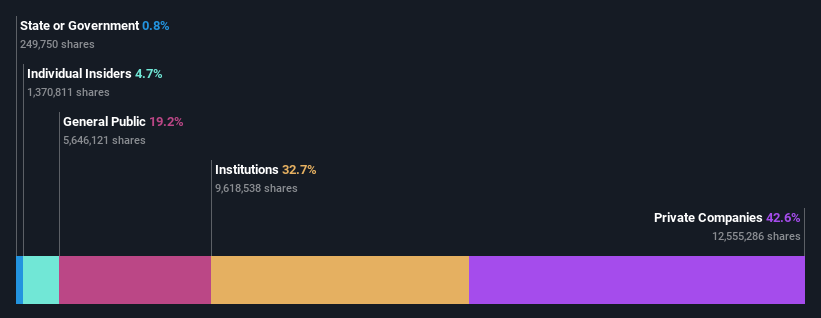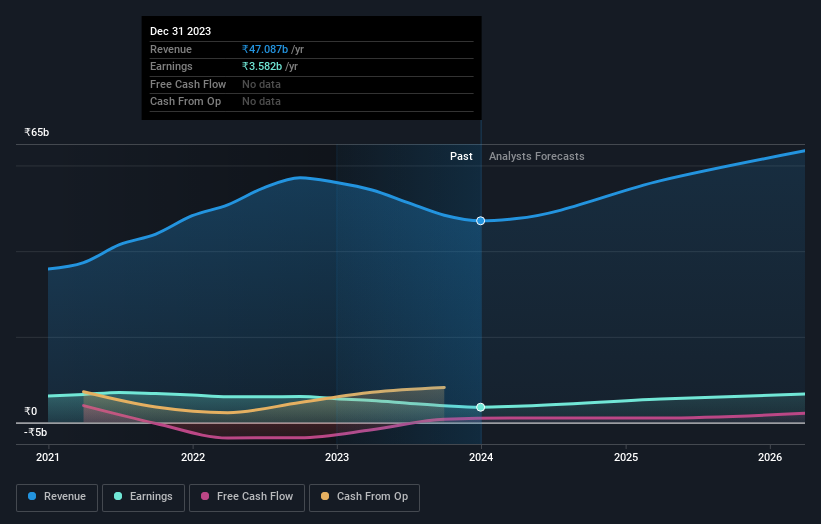Stock Analysis
Institutions along with private companies who hold considerable shares inAtul Ltd (NSE:ATUL) come under pressure; lose 5.1% of holdings value

Key Insights
- Significant control over Atul by private companies implies that the general public has more power to influence management and governance-related decisions
- The top 6 shareholders own 52% of the company
- Institutions own 33% of Atul
Every investor in Atul Ltd (NSE:ATUL) should be aware of the most powerful shareholder groups. And the group that holds the biggest piece of the pie are private companies with 43% ownership. In other words, the group stands to gain the most (or lose the most) from their investment into the company.
While the holdings of private companies took a hit after last week’s 5.1% price drop, institutions with their 33% holdings also suffered.
Let's delve deeper into each type of owner of Atul, beginning with the chart below.
Check out our latest analysis for Atul

What Does The Institutional Ownership Tell Us About Atul?
Many institutions measure their performance against an index that approximates the local market. So they usually pay more attention to companies that are included in major indices.
As you can see, institutional investors have a fair amount of stake in Atul. This implies the analysts working for those institutions have looked at the stock and they like it. But just like anyone else, they could be wrong. If multiple institutions change their view on a stock at the same time, you could see the share price drop fast. It's therefore worth looking at Atul's earnings history below. Of course, the future is what really matters.

Hedge funds don't have many shares in Atul. Looking at our data, we can see that the largest shareholder is Aagam Holdings Pvt Ltd. with 23% of shares outstanding. In comparison, the second and third largest shareholders hold about 9.5% and 5.7% of the stock. In addition, we found that Sunil Lalbhai, the CEO has 0.5% of the shares allocated to their name.
On further inspection, we found that more than half the company's shares are owned by the top 6 shareholders, suggesting that the interests of the larger shareholders are balanced out to an extent by the smaller ones.
Researching institutional ownership is a good way to gauge and filter a stock's expected performance. The same can be achieved by studying analyst sentiments. There are a reasonable number of analysts covering the stock, so it might be useful to find out their aggregate view on the future.
Insider Ownership Of Atul
The definition of an insider can differ slightly between different countries, but members of the board of directors always count. Company management run the business, but the CEO will answer to the board, even if he or she is a member of it.
Insider ownership is positive when it signals leadership are thinking like the true owners of the company. However, high insider ownership can also give immense power to a small group within the company. This can be negative in some circumstances.
We can see that insiders own shares in Atul Ltd. It is a pretty big company, so it is generally a positive to see some potentially meaningful alignment. In this case, they own around ₹8.1b worth of shares (at current prices). It is good to see this level of investment by insiders. You can check here to see if those insiders have been buying recently.
General Public Ownership
With a 19% ownership, the general public, mostly comprising of individual investors, have some degree of sway over Atul. This size of ownership, while considerable, may not be enough to change company policy if the decision is not in sync with other large shareholders.
Private Company Ownership
Our data indicates that Private Companies hold 43%, of the company's shares. Private companies may be related parties. Sometimes insiders have an interest in a public company through a holding in a private company, rather than in their own capacity as an individual. While it's hard to draw any broad stroke conclusions, it is worth noting as an area for further research.
Next Steps:
I find it very interesting to look at who exactly owns a company. But to truly gain insight, we need to consider other information, too. Be aware that Atul is showing 1 warning sign in our investment analysis , you should know about...
Ultimately the future is most important. You can access this free report on analyst forecasts for the company.
NB: Figures in this article are calculated using data from the last twelve months, which refer to the 12-month period ending on the last date of the month the financial statement is dated. This may not be consistent with full year annual report figures.
Valuation is complex, but we're helping make it simple.
Find out whether Atul is potentially over or undervalued by checking out our comprehensive analysis, which includes fair value estimates, risks and warnings, dividends, insider transactions and financial health.
View the Free AnalysisHave feedback on this article? Concerned about the content? Get in touch with us directly. Alternatively, email editorial-team (at) simplywallst.com.
This article by Simply Wall St is general in nature. We provide commentary based on historical data and analyst forecasts only using an unbiased methodology and our articles are not intended to be financial advice. It does not constitute a recommendation to buy or sell any stock, and does not take account of your objectives, or your financial situation. We aim to bring you long-term focused analysis driven by fundamental data. Note that our analysis may not factor in the latest price-sensitive company announcements or qualitative material. Simply Wall St has no position in any stocks mentioned.
About NSEI:ATUL
Atul
Atul Ltd manufactures and sells chemicals and other chemical products worldwide.
Excellent balance sheet with reasonable growth potential and pays a dividend.

